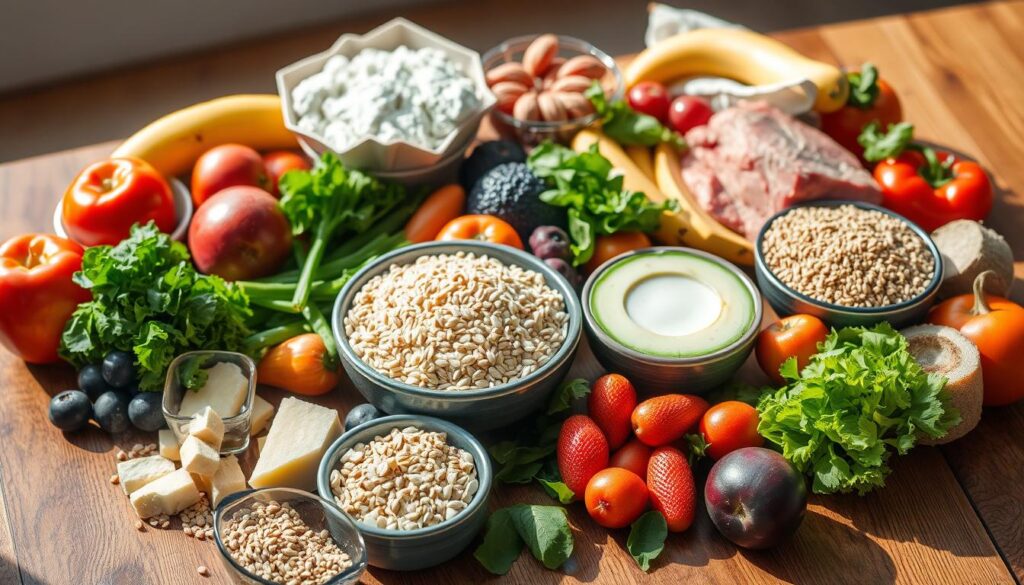Do you often feel tired and struggle to keep your energy up all day? You’re not alone. Many people deal with low energy due to their diet, lifestyle, or health issues. Luckily, there are ways to boost your energy naturally. This article will share 5 science-backed tips to make you feel more alive and energetic.
Key Takeaways
- Incorporate more magnesium-rich foods into your diet to support energy production.
- Engage in regular physical activity, but avoid exercising too close to bedtime.
- Prioritize a balanced and nutritious diet to fuel your body with essential nutrients.
- Manage stress and get adequate sleep to maintain healthy energy levels.
- Stay hydrated and limit alcohol consumption to prevent energy-draining dehydration.
Table of Contents
The Importance of Maintaining Healthy Energy Levels
Keeping your energy levels up is key to feeling good and being productive. Low energy can make you feel tired, make it hard to focus, make you irritable, and lower your motivation. Knowing when you’re feeling low is the first step to getting your energy back.
Recognizing the Signs of Low Energy
Feeling always tired, having trouble staying focused, and mood swings can show you’re not feeling energetic. It’s important to notice these signs and change your habits to feel better.
- Fatigue and lack of energy
- Difficulty concentrating
- Irritability and mood swings
- Decreased motivation and productivity
Knowing these symptoms lets you take steps to fix the problems and boost your energy naturally. This can make you feel better overall and help you reach your goals.
| Symptom | Potential Causes | Recommended Actions |
|---|---|---|
| Fatigue and lack of energy | Poor sleep, sedentary lifestyle, nutrient deficiencies | Prioritize sleep, exercise regularly, and maintain a balanced diet |
| Difficulty concentrating | Stress, dehydration, blood sugar imbalances | Practice stress management techniques, stay hydrated, and eat regular, nutrient-dense meals |
| Irritability and mood swings | Hormonal imbalances, lack of physical activity, poor sleep | Engage in regular exercise, establish a consistent sleep routine, and consider hormone-balancing supplements |
| Decreased motivation and productivity | Burnout, lack of purpose, mental fatigue | Take breaks, find ways to reconnect with your passions, and prioritize self-care |
Understanding low energy and its causes helps you take steps to keep your energy up. This can make you feel better overall.
Increase Your Magnesium Intake
Magnesium is key for making energy. Not having enough can make you feel tired. Foods like almonds, hazelnuts, cashews, whole grains, and halibut help you get enough magnesium.
Women need about 300 milligrams of magnesium a day. Men need 350 milligrams. If you don’t get enough, you might breathe harder and get tired easily.
- Whole grains give you steady energy.
- Snacks with protein, fat, and fiber keep your energy up.
- A low-fat latte with protein-rich foods gives you a boost.
If you’re always tired, check your thyroid and blood count. Your kidneys control magnesium levels, and about 30%-40% of what you eat gets absorbed.
Many Americans don’t get enough magnesium, but supplement users often do. Supplements come in different forms, some better than others. Choose a good one for better energy.
“A brisk 10-minute walk can increase energy and the effects can last up to 2 hours, according to experiments by Robert Thayer, PhD.”
The Importance of Magnesium
Magnesium is crucial for energy. Eating magnesium-rich foods and taking supplements helps your body work well. This keeps your energy steady all day.
Stay Active and Exercise Regularly
It might seem odd, but increasing your physical activity can boost your. A short, brisk walk can give you a boost that lasts up to 2 hours. Regular exercise also lifts your mood and energy levels. Adding activities like walking, jogging, or cycling to your day can make you feel more alive.
Aerobic exercises like running, cycling, or swimming help with depression and anxiety. Research shows they’re great for adults with major depression. Even yoga can ease symptoms of depression and anxiety.
A study looked at 1.2 million adults and found regular exercise meant fewer bad mental health days. All exercises, from running to skiing, were linked to better mental health.
The U.S. Department of Health and Human Services suggests 150 minutes of moderate or 75 minutes of vigorous aerobic activity weekly. More activity, up to 300 minutes, brings even more health benefits. Include strength training for all major muscle groups at least twice a week.
Even a little bit of exercise is good, and short activity sessions throughout the day help too. So, stay active and exercise regularly to increase your energy and support your health.

how to increase energy levels naturally
Adopt a Balanced and Nutritious Diet
The foods you eat greatly affect your energy. Eating foods that are whole and unprocessed helps keep your blood sugar stable. This gives your body the nutrients it needs for energy. Stay away from foods with lots of added sugar, which can make you feel tired. Instead, go for complex carbs, lean proteins, and healthy fats to keep your energy up all day.
Studies show that eating breakfast helps people do better at work and school. Start your day with a meal that has whole grains, protein, and healthy fats. This will make you feel energized and focused.
- Incorporate complex carbohydrates like whole grains, quinoa, and brown rice to provide sustained energy.
- Choose lean proteins such as chicken, fish, or legumes to support muscle function and energy production.
- Include healthy fats from sources like avocado, nuts, and olive oil to help regulate blood sugar levels.
- Opt for nutrient-dense fruits and vegetables to provide essential vitamins and minerals.
- Limit your intake of processed foods, added sugars, and unhealthy fats, which can deplete your energy levels.
| Food Category | Energy-Boosting Benefits |
|---|---|
| Complex Carbohydrates | Provide sustained energy and stabilize blood sugar levels. |
| Lean Proteins | Support muscle function and energy production. |
| Healthy Fats | Help regulate blood sugar levels and provide long-lasting energy. |
| Fruits and Vegetables | Offer essential vitamins, minerals, and antioxidants for overall health and energy. |

“The key to maintaining consistent energy levels throughout the day is to focus on a balanced diet rich in whole, nutrient-dense foods.” – Registered Dietitian
Manage Stress and Prioritize Sleep
Stress and poor sleep are big reasons for feeling tired. Chronic stress makes you feel worn out, using up a lot of energy. Not sleeping well can also make you feel tired and slow.
To fight these problems, add stress-reducing activities to your daily life. This can help you feel better.
Meditation is a great way to handle stress. Just a few minutes of quiet time each day can calm your mind and lessen stress symptoms. Regular exercise is also good for stress. It releases happy chemicals and helps you deal with anxiety and tension.
Getting enough sleep is also key for staying energetic. Try to sleep 7-9 hours each night to recharge fully. Stick to a regular sleep schedule, have a calming bedtime routine, and make your bedroom cool, dark, and quiet.
| Sleep Strategies | Benefits |
|---|---|
| Limiting caffeine and alcohol intake | Improves sleep quality and duration |
| Exposure to bright light during the day | Helps synchronize the body’s internal clock |
| Avoiding late-night snacking | Promotes better sleep and digestion |
| Incorporating relaxation techniques | Eases the mind and body into sleep |
Focus on managing stress and getting good sleep to boost your energy and well-being. Add these tips to your daily life. You’ll feel more awake, focused, and productive all day.
Stay Hydrated and Limit Alcohol Consumption
Drinking enough water is key to feeling more energetic and fighting off fatigue. Not having enough water can make you feel tired, so drink water often. You can make it tastier by adding lemon, herbs, or fruit slices. Drinking water helps your brain, mood, and body work better.
Also, drinking less alcohol can make you feel more awake. Alcohol can mess with your sleep and make you feel tired the next day. The Centers for Disease Control and Prevention say 35% of Americans don’t get enough sleep, which makes them feel tired and low on energy.
- Women should aim for 9 glasses of water per day, while men should target 13 glasses to stay hydrated and energized.
- Restricting alcohol intake to no more than 14 units per week can improve sleep quality and energy levels.
- Mild dehydration (fluid loss of 1–3%) can impair energy levels, mood, and lead to reductions in memory and brain performance.
By drinking plenty of water and drinking less alcohol, you can boost your energy and feel better all day.
“Dehydration can contribute to hangover symptoms, such as thirst, fatigue, headache, and dry mouth. Drinking water can aid weight loss by increasing satiety, boosting metabolic rate, and potentially promoting calorie burning.”
Conclusion
By using these 5 natural ways, you can boost your energy and feel more alive. Everyone is different, so you might need to try a few things to see what works for you. Start by taking care of yourself, listening to your body, and slowly changing your habits to feel more energetic.
Drinking enough water, staying active, and eating foods full of nutrients are key to keeping your energy up. Also, managing stress, getting good sleep, and drinking less alcohol can help you feel more energetic and healthy.
Finding the right way to boost your energy might take time. Be patient and talk to a doctor if you have questions or need advice. Adding these natural tips to your daily life can help you find the energy and joy you want to live fully.
FAQ
What are the common causes of low energy levels?
Many things can make you feel tired, like what you eat, how you live, and your health.
How can I increase my energy levels naturally?
You can boost your energy by eating well, staying active, and managing stress. Also, getting enough sleep and drinking plenty of water helps.
Why is it important to maintain healthy energy levels?
Having enough energy is key to feeling good and being productive. Low energy can make you tired, unfocused, irritable, and less motivated.
How can I recognize the signs of low energy?
Look out for signs like feeling tired, having trouble focusing, getting easily annoyed, and lacking motivation. These are clues you need more energy.
What are the benefits of incorporating stress-reducing activities into my daily routine?
Stress can drain your energy. Doing things that relax you, like meditating, exercising, or enjoying hobbies, can help. This can make you feel more energetic.
How can staying hydrated and limiting alcohol consumption help increase my energy levels?
Not drinking enough water can make you feel as tired as if you were really fatigued. Drinking less alcohol can also help. It can disrupt your sleep and make you feel more tired the next day.

Hello, I am Olivia Stone, and I’m here to help you find balance in the chaos. As a wellness coach, I’ve spent years teaching busy professionals how to integrate mindfulness, stress management, and holistic health into their daily routines. Wellness doesn’t have to be complicated—it’s about small, intentional actions that bring peace and positivity into your life. Let’s work together to create a lifestyle that not only supports your goals but inspires you to feel great inside and out.

